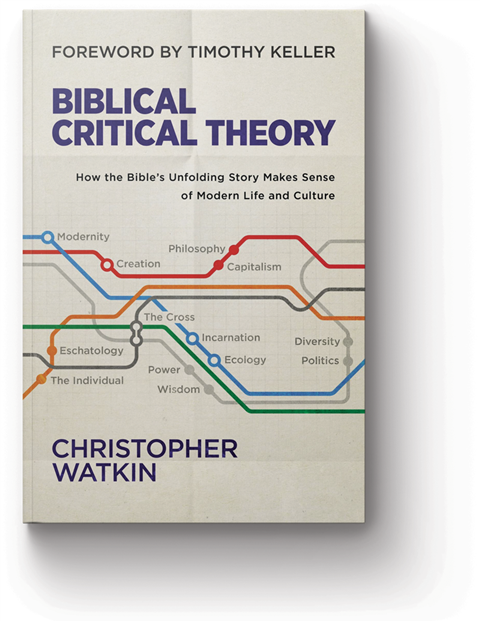
There are times when our culture seems conflicted and confusing and the things we normally rely on to help us navigate our way through the fog seem to fail us.
Chris Watkin’s book Biblical Critical Theory: How the Bible’s Unfolding Story Makes Sense of Modern Life and Culture promises to be that cultural compass that can help us get back on track.
This highly-anticipated book sold out its first print run before it was released. It comes with a glowing foreword from Tim Keller and commendations from leading lights in the British conservative evangelical scene.
This is surprising for a book with the words “critical theory” in the title, as for some in the evangelical world Critical Race Theory is seen as public enemy number one.
So why is this book causing such a stir and should you read it?
Chris Watkin is Professor of French Philosophy at a respected left-wing secular university in Australia. A bona fide academic, he genuinely knows what he is talking about when it comes to secular western thought. Watkin is also a clear and devout evangelical who wants to equip Christian leaders, students and culture-makers to see their interactions with modern life through the lens of the Bible.
Watkin helpfully defines a critical theory (and there are many - Race, Feminist, LGBT etc) as a tool that helps make things visible, viable and valuable.
As critical race theory aims to reveal unjust power structures, so biblical critical theory, according to Watkin, aims to make visible God’s redemptive story and how it subversively fulfils the longings and challenges of our world.
The book begins well, as Watkin talks about the need to “out-narrate the world”. What follows are 28 chapters of systematic biblical theology that traverse some of the major contours of the biblical narrative and reflect on their doctrinal implications and potential apologetic opportunities.
Watkin’s approach is to “diagonalize” each major Christian doctrine with two extremes of related secular philosophies. For example, in his chapter on Moses and the Exodus, Watkin shows how the political left often focuses on compassion and alleviating the causes of crime while the right focuses on punishment and protecting the innocent. He argues that God resolves this tension: “The Lord, the Lord, a God merciful and gracious…but who will by no means clear the guilty.” These diagonalizations are often very helpful as an aide-memoire, and I found myself using one of these ideas in a conversation I was having with a secular friend soon after.
Watkin’s analysis of western philosophy is excellent. So is his ambition of creating a theological engagement with our western philosophy. His writing style is engaging as he often drops in pop-culture references. His winsome manner is also praiseworthy – he comes over as knowledgeable and humble in his writing. He cites theologians inside and outside of his tribe – from Tim Keller and Don Carson to NT Wright, Hans Georg Gadamer and John Milbank. Books like this can really help equip Christians to understand what we believe, to see how some of the major strands of thought intersect with our faith, and to explain that to non-believing friends.
My main concerns about the book are twofold.
Firstly, who says? Where are the women’s voices? The non-white voices? Where are the contemporary non-Western philosophers and theologians? The title underlines my fear that the readers might be left with the impression that there is a singular culture that needs engaging with and a definitive once-and-for-all biblical theology that can make sense of it. To what extent is the book a White Male Western Biblical Critical Theory?
Secondly, so what? Watkin likes to use this two-word critique in his student’s essays, but I found myself asking it at the end of each chapter too. The analysis was fascinating, but we are commanded to love God with all our heart and soul as well as with our mind. I would have loved some more holistic, practical suggestions on how to engage with issues such as poverty, the refugee crisis, racism, ecology etc. No one book can do everything but why should a biblical critical theory be less practical than other contemporary critical theories? It’s unusual to read a book on critical race theory, for example, that does not include practical implications for life and politics.
These questions aside, I am very glad this book has been written and is being read. There’s actually very little out there quite like it - grounded in biblical theology and robustly applied to contemporary Western culture. Often biblical scholars are disengaged from culture and those expert in cultural analysis are often detached from biblical theology. Watkin leads the way with this outstanding guide, which I thoroughly recommend.







































No comments yet